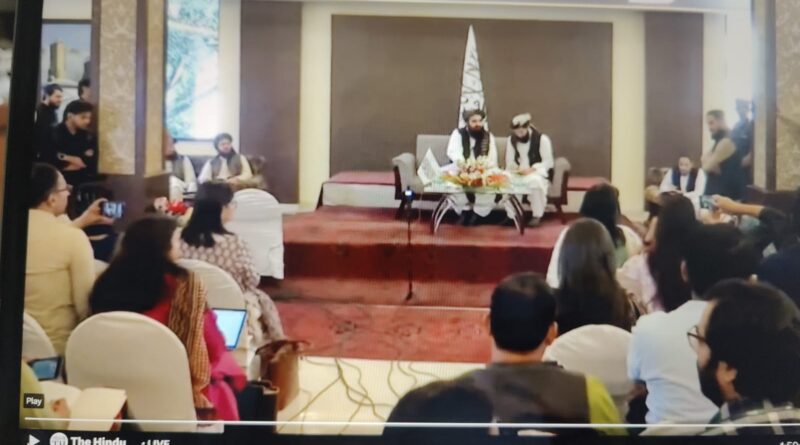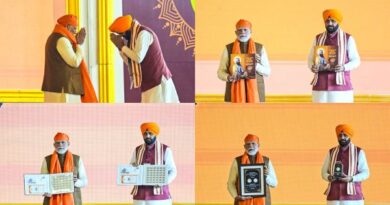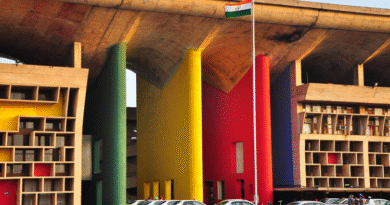Taliban FM Muttaqi Faces Backlash Over Women Journalists’ Exclusion, Holds Inclusive Presser in Delhi
Amid outrage from Indian opposition leaders and media, Afghan Foreign Minister clarifies ‘technical glitch’ as female reporters take front-row seats; discusses women’s education, India ties, and Pakistan tensions
New Delhi, October 12, 2025 – In a bid to defuse a brewing controversy, Afghanistan’s Taliban Foreign Minister Amir Khan Muttaqi held a second press conference at the Afghan Embassy here on Sunday, this time prominently featuring women journalists in the front row—a stark contrast to Friday’s all-male event that ignited widespread criticism for apparent gender discrimination.
The initial presser on October 10, organized shortly after bilateral talks with India’s External Affairs Minister S. Jaishankar, drew sharp rebukes from Indian politicians and journalists who accused the Taliban of exporting its restrictive policies to Indian soil. No women reporters were invited or allowed entry, despite suggestions from Indian officials for inclusivity. Congress leaders, including Rahul Gandhi and Priyanka Gandhi Vadra, slammed the incident as a “shameful” endorsement of misogyny by the Indian government, with Rahul tweeting that Prime Minister Narendra Modi’s “silence” signaled weakness in defending women’s rights. Former Home Minister P. Chidambaram went further, urging male journalists to have walked out in solidarity.
Defending the omission during Sunday’s event, Muttaqi attributed it to a “technical reason,” explaining in Pashto (with translation provided): “Last time, due to limited time, a short list of journalists was prepared, and that’s why not everyone was invited. There was no other intention behind it.” The Ministry of External Affairs (MEA) clarified it had “no role” in the embassy-hosted interaction, emphasizing India’s commitment to gender equality.
Key Highlights from the Press Conference
Muttaqi’s visit, the first by a senior Taliban official since the group’s 2021 takeover, focused on mending ties with India amid regional volatility. He outlined five major points:
1. Women’s Education and Rights: Addressing global concerns, Muttaqi claimed over 10 million students, including 2.8 million women and girls, are enrolled in schools and madrasas up to graduation level in Afghanistan. “We are not against education; it is not haram (forbidden). Restrictions apply only in specific areas and have been deferred until a better system is in place,” he said, pushing back against UN reports estimating 1.1 million girls out of school and an 80% female exclusion from education, jobs, or training. He lamented rising child marriages (up 25%), maternal mortality (up 50%), and daily suicides among women (1-2 cases), but insisted the situation is improving.
2. Reopening Indian Embassy in Kabul: Following his meeting with Jaishankar, India announced it would upgrade its mission in Kabul to full embassy status, with Afghan diplomats soon arriving in New Delhi. Muttaqi hailed this as a “positive step” for bilateral relations.
3. Boosting Trade, Flights, and Investments: Both sides agreed to increase direct flights between Kabul and Delhi. Afghanistan invited Indian investments in mining, agriculture, and sports, while discussions touched on the Chabahar port. Muttaqi urged reopening the Wagah border for faster trade routes, calling it the “quickest and easiest path” between the two nations.
4. Condolences for Indian Journalist: Muttaqi expressed sorrow over the 2021 death of Reuters photojournalist Danish Siddiqui in Afghanistan, stating no journalists have been harmed in the country over the past four years. “We regret every loss,” he added, contrasting it with decades of foreign occupations by the Soviet Union, US, and NATO, which he said left Afghanistan “free and standing on its own” today.
5. Tensions with Pakistan: Responding in Urdu to queries on border clashes, Muttaqi clarified: “We have no enmity with Pakistan’s people, but some elements are creating trouble.” He referenced a recent Afghan operation halted with Qatari and Saudi mediation, warning, “Talk to us for peace, or we have other ways.” Denying Tehreek-e-Taliban Pakistan (TTP) presence in Afghanistan, he accused Islamabad of harboring ISIS militants and violating Afghan airspace—claims tied to overnight clashes where Kabul reported killing 58 Pakistani soldiers and capturing 25 posts in “retaliatory” strikes. Pakistan countered, claiming over 200 Afghan fighters killed and vowing a “strong response,” with major crossings like Torkham and Chaman closed amid escalating fears of broader conflict.
Broader Context: Taliban’s Gender Policies Under Scrutiny
The episode underscores persistent UN-documented curbs under Taliban rule: bans on girls’ education beyond Class 7, women’s unescorted outings, beauty parlors (closed 2023), parks, gyms, and sports clubs (by 2025), and media restrictions barring female anchors from on-camera roles. Critics, including the Indian opposition, argue hosting such figures without pushback dishonors global women’s rights norms.
As Muttaqi’s seven-day visit continues, including a stop at Deoband’s Darul Uloom, eyes remain on whether India-Afghanistan thaw can navigate Pakistan’s ire and Taliban reforms. Analysts warn the border flare-up risks regional instability, especially with Pakistan accusing India of stoking militancy.




